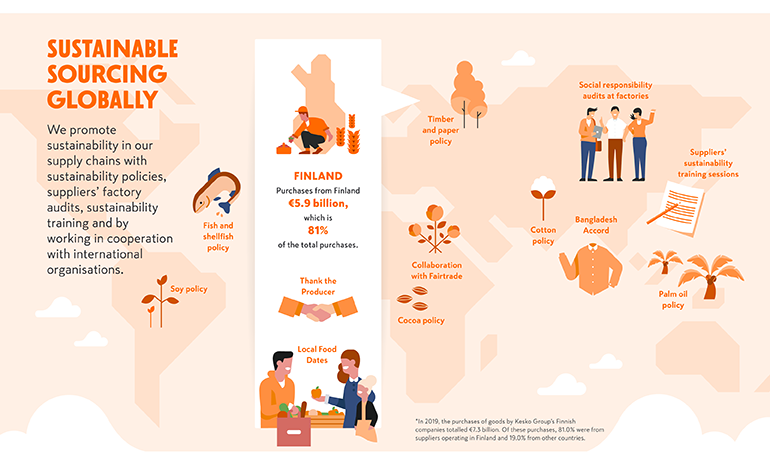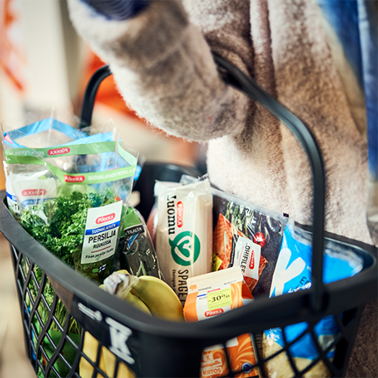Finland is lagging behind in its achievement of the EU’s targets to reduce the use of plastic carrier bags and for recycling plastic. New measures are needed and both businesses and customers must be involved. Customers are being encouraged to reduce...

Kesko has published sustainability reports for 20 years – sustainability has become mainstream
Over the past 20 years, corporate responsibility efforts have become an integral part of operations for many companies, and an increasing number of companies have begun related reporting. Last year, some 160 companies in Finland issued sustainability reports (source: FIBS).
“The annual reports issued by companies provide valuable tools to investors, analysts and rating agencies, but they also act as an excellent and reliable source of information for the media, NGOs, students and personnel. International demands for reporting have grown over the years. Today, companies are expected to provide assured information on, for example, their own emissions and those of their supply chain, the results of audits in high risk countries, as well as personnel diversity and occupational health and safety,” says Matti Kalervo, Vice President of Corporate Responsibility at K Group.
Kesko is one of the pioneers of sustainability reporting: we published our first Corporate Responsibility report in accordance with the Global Reporting Initiative (GRI) guidelines back in 2000.
Kesko’s Annual Report provides comprehensive information
The section of the Annual Report entitled Kesko’s direction describes Kesko and its divisions and the progress made in their strategy execution, as well as our financial targets, operating environment and value creation.
“2019 was a very strong year for Kesko and K Group. Our strategy of profitable growth and strong transformation has yielded results. At the core of our strategy is focusing our operations as ‘One unified K’ on the grocery trade in Finland, building and technical trade in Northern Europe, and car trade in Finland. Our strategic objective is to strengthen the customer experience for consumers and businesses, both in our stores and digital channels,” says K Group’s President and CEO Mikko Helander in his review.
Kesko’s Annual Report 2019 describes the progress made in Kesko’s strategy execution and sustainability work, with comprehensive performance indicators. The report contains Kesko’s financial statements, Report by the Board of Directors, Corporate Governance Statement, and Remuneration Statement for 2019. The review of non-financial information is included in the Report by the Board of Directors. The Sustainability section is prepared in accordance with the GRI standards and it covers the key areas of economic, social and environmental responsibility.
Sustainability figures from 2019
Society:
Kesko and K-retailers are significant employers, tax payers and product and service providers.
• In 2019, the income taxes paid by Kesko to Finland totalled €65.9 million and to other countries €11.8 million. The Group’s effective tax rate was 17.3%.
• K Group’s total capital expenditure in Finland in 2019 was approximately €491 million (2018: €408 million).
• Kesko’s community investments totalled €2.2 million (2018: €1.8 million).
• By the end of 2019, our K Charge electric car charging network comprised almost 270 basic charging points and over 100 fast charging points at nearly 80 K-store locations.
Selections and purchasing:
Most of our purchases are made from suppliers operating in Finland. In global purchases, we pay special attention to human rights issues and environmental impacts in our supply chains.
• By the end of 2019, products sold under our ‘Thank the Producer’ operating model had accrued more than €2.94 million in additional money for farmers.
• At the beginning of 2020, Kesko’s suppliers in high-risk countries had a total of 733 (2018: 585) valid social responsibility audits.
• In 2019, a total Fairtrade premium of €964,807 was generated by products sold by K-food stores and Kespro (2018: €915,909).
• In 2017, we set a target that by 2020, at least 400 K-food stores would have dedicated ‘veggie shelves’ for plant protein products. At the end of 2019, there were veggie shelves already in approximately 700 K-food stores.

Climate and environment:
We are committed to international climate summit goals on the mitigation of climate change. We have set science-based emission targets for our operations and supply chain.
• Food waste in 2019 was down by 3% from the 2016 base level. The amount of food products donated to charities by K-food stores was 4% higher than in 2018.
• Direct and indirect emissions (Scope 1 and 2) decreased by 7% from the previous year.
• Relative emissions from Kesko Logistics decreased by 9.4% from 2018.
• At the end of 2019, there were 413 (2018: 405) Rinki eco take-back points for recycling consumer packaging (fibre, glass, metal) located at K-food store sites. Plastic was collected at 227 (2018: 193) eco take-back points.
• During the third year of our K Fishpaths collaboration, we built more than 60 gravel beds and removed 7 barriers for spawning, opening up as much as 50 km of new spawning grounds and habitat formerly inaccessible to fish.
• In 2019, we initiated extensive work to identify the products in each division that are sustainable from a climate perspective.
Working community:
We aim to be the most attractive workplace in the trading sector, with special focus on developing our corporate culture, leadership, and employee wellbeing.
• In 2019, Kesko had an average of 20,852 employees (2018: 19,579) in eight countries: Finland, Sweden, Norway, Estonia, Latvia, Lithuania, Poland and Belarus. 48% of the personnel were based in Finland and 52% in the other operating countries.
• In Finland, the average age of employees was 37.4 in 2019. In the other countries, the average age of employees varied from 35 to 45 years.
• In 2019, Kesko’s occupational health care spent €492 (2018: €447) per employee on maintaining personnel working capacity and providing medical care.
• Training costs per employee in 2019 totalled €224 (2018: €277).
 YES
YES
 NO
NO













